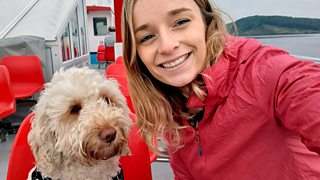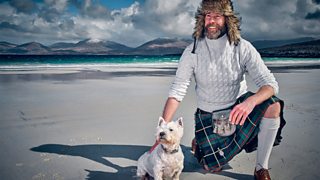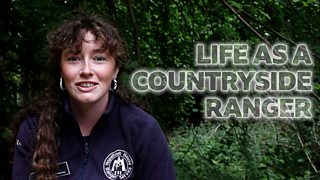How otter poo started my lockdown adventure
By Christina Sinclair // 大象传媒 The Social contributor // 5 April 2022
In March 2020, Scotland was plunged into lockdown and most of us were only allowed to leave the house once a day. Like many, I was furloughed and had plenty of time on my hands, so I made it my mission to track down the local otter (as you do).
Despite living in the Clyde area for three years, I’d only caught a glimpse of an otter a handful of times. They are notoriously shy and are also crepuscular, meaning they mostly tend to be active at dawn or dusk.
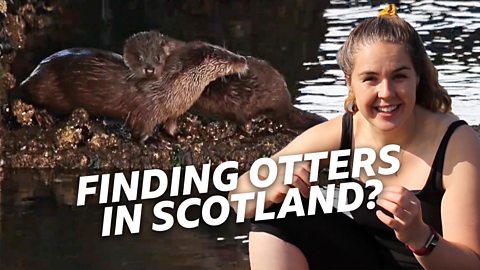
Otter Watch In Scotland
I just want to make pals with a wee otter family.
I knew I had a challenge on my hands, but channelling my inner Bear Grylls, I thought I was up to the task. I decided to set up a camera trap, which continuously records footage when anything moves in front of it. I’d managed to track down some old otter poo - officially called ‘spraint’ - and planted the camera trap with some tinned fish.
I was confident I would get my first sighting within the week! Never have I been more wrong - turns out the local cats really love it when you leave fish out on a random rock, so I quickly decided to ditch that idea.
Over a month went by and still no sight of the otter. To be perfectly honest, I'd pretty much given up hope. Then, on one magical day, I found the perfect spot to set up my camera trap: a patch of rock, ironically about 100m from my flat, was covered in otter poo. Old poo, fresh poo, large poo, medium poo...I'd never been so happy to see otter poo in my life!
I set the camera trap, left it for a few days and finally had success.
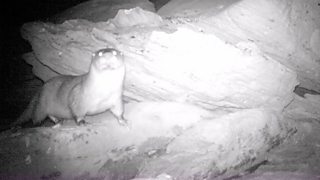
Peering out of the dark came the cutest face and bushiest whiskers I have ever seen. To my surprise, it soon turned out that there wasn’t just one otter: we actually had a mother and her pup. I continued to leave the camera trap out at this same spot, checking it every few days and just watching the comings and goings of this adorable pair.
Otter mothers give birth to their young in a type of den known as a holt where the young will stay for about ten weeks. Even after they’ve ventured outside though they tend to stick around with mum for quite a long time, sometimes up to a year, before fully venturing into independence.
As lovely as it was watching their antics on the camera trap, I was desperate to see them in real life. One evening, I was sitting on a rock wistfully hoping for a small head to pop up out of the sea, when finally I saw it. It was just one of the otters, most likely mum. She was actually much less shy than I’d expected, almost seeming quite curious and trying to check me out.
This happened a couple more times and I felt I was starting to work out a few of her habits, when and where she might be active. And then I had another surprise: this wasn’t just a family of two. Oh no, this was a family of three!
All I ask on behalf of my new otter pals is: don鈥檛 leave your rubbish! Put it in the bin, recycle it, or even better try and avoid using single use items
Going out for a walk in the evenings to look for this little family became a bit of a ritual for me during the later half of lockdown. Sometimes I wouldn’t see them at all, sometimes it would be just a brief glimpse, but then on a couple of occasions I got to watch them for hours, diving and feeding and cleaning each other and just interacting as a little family does.
They had plenty to eat, no predators and seemed perfectly content in this new quiet world that lockdown had brought on. This little otter family added so much value to my lockdown experience, giving me something to work towards, keeping me positive but also keeping me connected with the natural world.
It got me thinking about what I could do for them to return the favour.
As lockdown eased and life began to get back to some kind of normality, I noticed a worrying increase in the amount of litter and rubbish dropped in the same spots where I’d watched the otters fish and play.
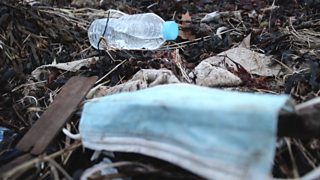
But it was more than just the usual rubbish that we’ve all sadly become accustomed to, we had a new culprit: single use masks. How easy would it be for either mum or one of the pups to accidentally eat or get tangled in our mess? Lockdown gave wildlife like these otters a much-needed respite from all the pressures that we as humans put on them, and it’s something that we should really be learning from.
All I ask on behalf of my new otter pals is: don’t leave your rubbish! Put it in the bin, recycle it, or even better try and avoid using single use items and have a careful think about the amount of waste that you add to the planet.
Lockdown was challenging in so many ways, but we have a chance to emerge from it with a new appreciation for nature. If we do that, and act on it, then other wildlife and otter families like this might end up being a common site around all our Scottish rivers and coastlines.

